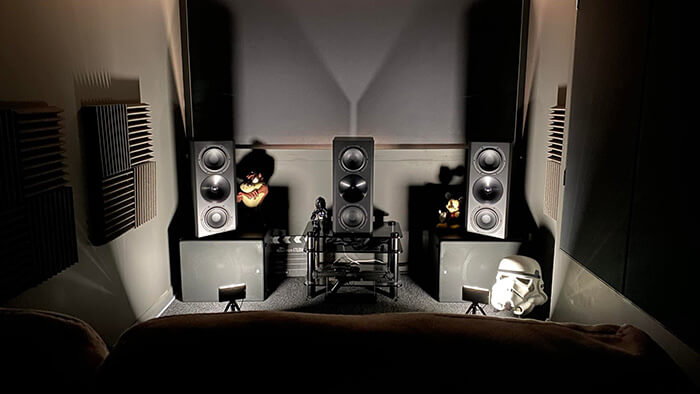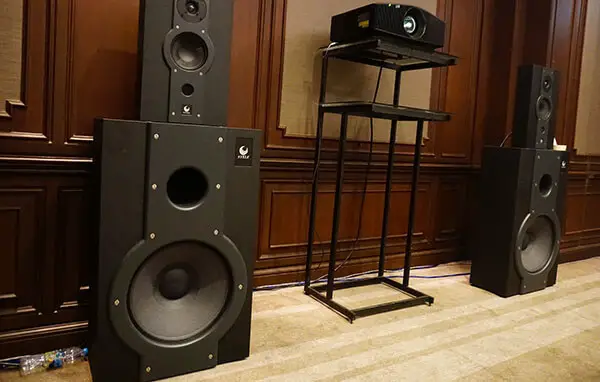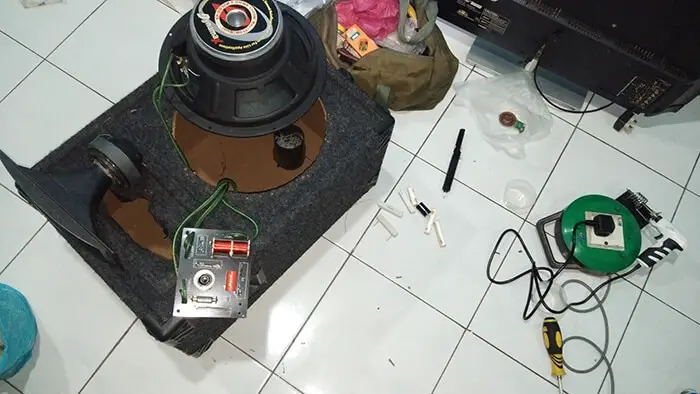Do you want to know the secret to extending the lifespan of your Vinyl records? Do you want to preserve them for generations without getting smudges and blemishes?
Well, no, you don’t need to learn any magic spells, you can make this a reality by regularly cleaning and maintaining your records. The more neat and tidy they are, the longer they live.
Join us as we’re going to shed light on the ultimate DIY record cleaning solution guide in this article. We will tell you all the materials you need and how to get started so buckle up.
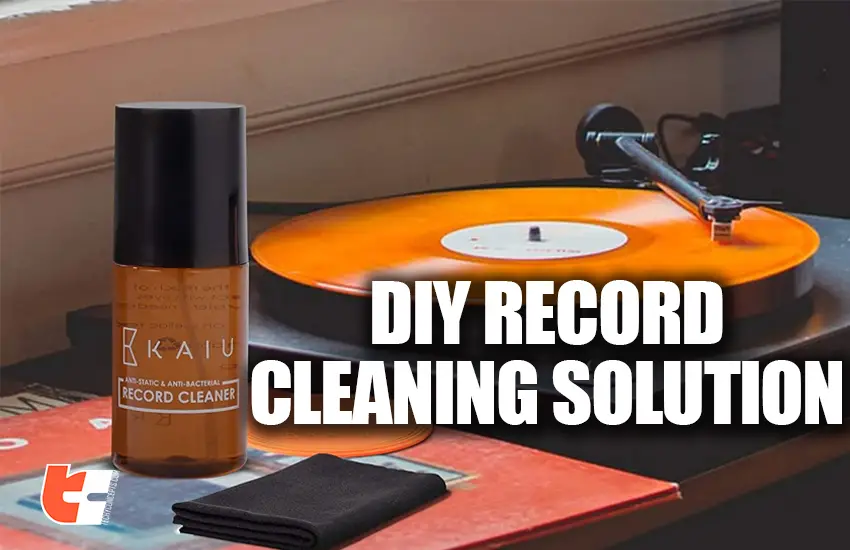
How to Clean Vinyl Records by Hand? Step-by-step Guide
Some people believe that cleaning and maintaining vinyl records is an expensive hassle. However, that’s not really the case. You can clean vinyl records within the comfort of your home with your hands, using very simple ingredients such as a brush, soap, water, etc.
Not only that, the estimated duration of this cleaning process will be no longer than 5-6 minutes and you don’t need extensive prep-up either.
Sounds awesome, right? Let’s get started!
All The Things You’ll Need:
- Carbon Fiber Record Brush
- Cleaning Solution
- Microfiber cloth/pad
- Distilled Water
- Dish Detergent
Step 1: Dry Cleaning
When it comes to any vinyl cleaning, the first step has to be thorough dry cleaning. You can use any standard brushes but we would recommend using a carbon fiber record brush for better results. Our top pick would be the ‘Audio Quest’ brush which has tiny fibers but in large quantity than a standard brush.
Remember, using a good-quality brush for dry cleaning will result in better conductivity to help neutralize static and not just clean loose dust.
Step 2: Prepare Record Cleaning Solution
Don’t get scared already. It’s really simple. Grab a bowl or a cup. Pour half a tablespoon of dish detergent in it and then pour in two tablespoons of distilled water. Mix gently until a foamy soapy solution is formed.
Or, if you’re too tired to do all that and don’t mind spending a few bucks, you can get GrooveWasher which is our top favorite record cleaning fluid – fast and convenient.
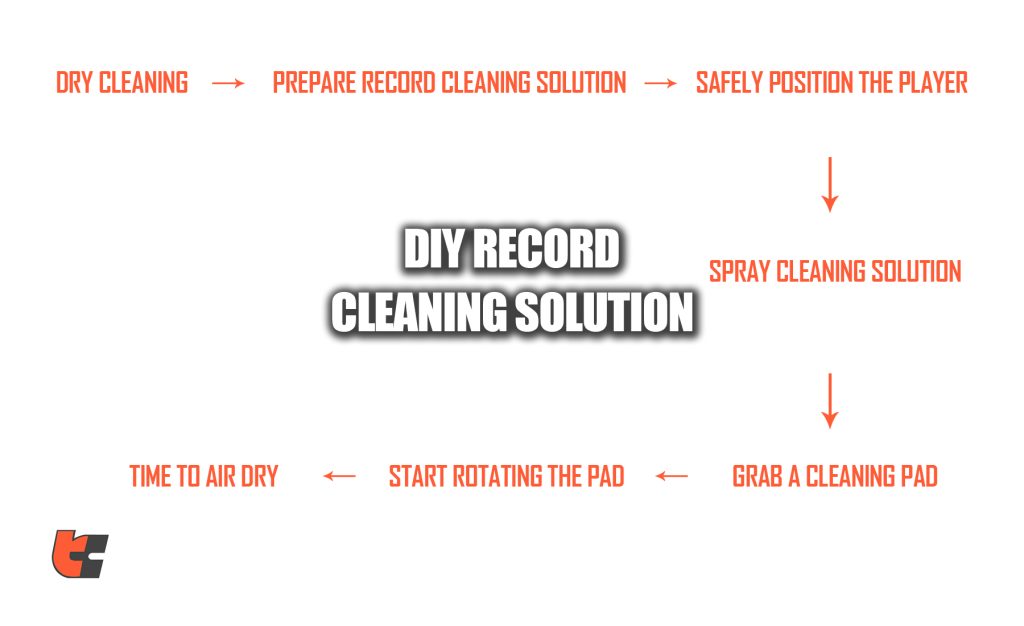
Step 3: Safely Position The Player
For this step, we are going to need a microfiber towel or any soft clean cloth. You can also use a record cleaning mat. Next, gently place the record player on top of the cloth. Do the whole setup on an even table surface.
Step 4: Spray Cleaning Solution
Once you have a cleaning fluid all set, transfer it to a spray bottle and spray 5-6 mists all over the vinyl record until it’s fully drenched and covered. Afterwards, leave it like that for 15-20 seconds.
Now, if you hadn’t done the dry cleaning earlier, you’ll notice that the dust particles have become all smudgy and grimey after coming into contact with the liquid. (In that case, use a wet tissue, wipe all over the player, let it dry and start all over again from the first step.)
Step 5: Grab a Cleaning Pad
Now, use a cleaning pad or smooth sponge and very gently apply the leading edge of the pad to the record. Carefully wipe the record in concentric arcs with light pressure. and not across the grooves. Swipe all over the entire record at least 3 times as gently as you can.
If you rush during this step or use high force of your hands, you may cause damages.
Step 6: Start Rotating The Pad
Now move around the pad to gently pat and clean and groom the surface. If you can detect any spots that’s still dirty or looks problematic, spray some more of the cleaning fluid and wait for 5-10 seconds. Next, use the pad to gently scrub in round motion all around the surface, especially in the direction of the grooves.
If your records were buried in the dirt for years and you’re cleaning after ages, it may require 2 or 3 cleaning sessions to get that perfect shiny look on the surface.
Step 7: Time to Air Dry
Yes, you don’t want to start playing songs yet. Even if it doesn’t look like it, your record is still wet and needs some time to dry off from its damp state. What you can do is stack the records on toast or dish racks and leave them out in a well-ventilated area, perhaps with a fan turned on above. Don’t be silly and try to expose them directly to the sunlight.
How To Clean Vinyl Records With a Record Cleaning Machine?
Not everyone is a fan of DIY methods. If you’re feeling exhausted and lazy you can simply get yourself a record cleaning machine(which is similar to a washing machine for clothes but definitely not so complicated.)
If you want to significantly speed up the cleaning process and get improved results, buying a record cleaning machine or a record vacuum cleaner will be worth the long-term investment.
You can go for the Spin Clean Record Washer or any other record baths that are sturdy and cost-effective. This way you can clean large batches of records in one sitting as the machine washed both sides of the record at the same time, this, potentially saving your time and sweats.
How Often Should You Clean Vinyl Records?
Honestly, there’s no fixed answer, it really depends on the usage. If you do a quick dry wipe of your records before and after each and every playback, using a dry napkin or a carbon fiber brush, there won’t be any significant dust build-up. In that case, you won’t have to wet clean the records that often. Once every two months should suffice in that case if you’re also storing the vinyl records in a good-quality inner sleeve.
However, bear in mind – overdoing anything has its side effects. You shouldn’t over clean a vinyl record. Only do a thorough wet cleaning if it ‘sounds’ dirty or the sound quality appears distorted than usual with abnormal pops and clicks.
You should maintain and look after your records in such a way so that wet cleaning is hardly required.
Can I Clean My Vinyl Records With Alcohol?
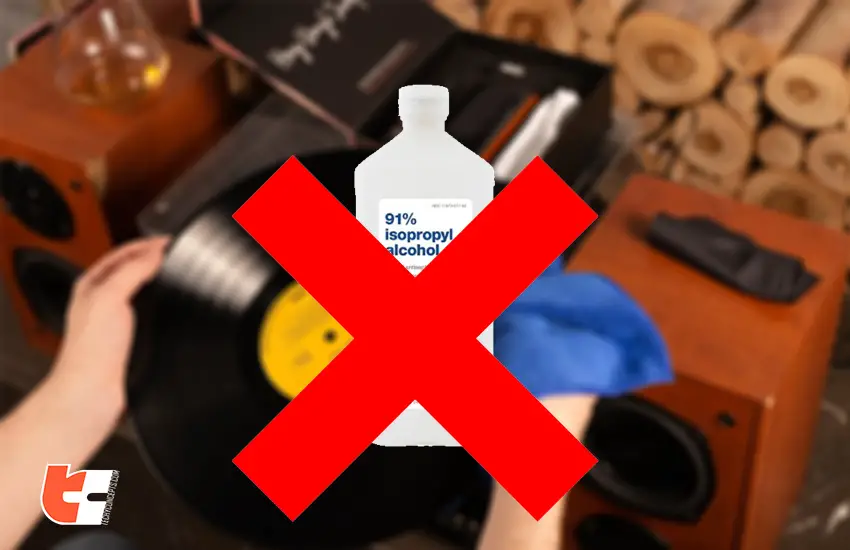
Our team experts advise that you should NEVER use isopropyl alcohol, even if in a small amount, on old shellac records as there are high chances the surface might dissolve away.
Apart from shellac records, if the material is modern PVC vinyl, you should still refrain from using alcohol for regular cleaning.
After an extensive research and experimentation, we have found out that alcohol is likely to cause the leaching of plasticizers, making your records more brittle and subject to excess wear. Remember, the goal is to extend their lifespan through cleaning not decrease it by making them even more fragile.
Wrapping Up
Cleaning records can be a messy time-consuming procedure but not when you’re following our tips and guidelines. If you’re negligent about regular cleaning, gradually gunk will start to build on your stylus and your records will be smothered with dust and dirt particles.
Eventually, the audio quality will start to deteriorate and you won’t enjoy playing and listening like you used to before. Therefore, make sure you’re doing quick dry wipes at least 3-5 times every month.
Frequently Asked Questions (FAQ):
Q.1: How do you make your own record cleaning solution?
Answer: You don’t need anything fancy. Just mix distilled water with a few drops of dish soap and you’ll be good to go. In case of stubborn dirt and grime accumulating over a long time, you may also use a small percentage of isopropyl alcohol and mix with the soap solution.
Q.2: What is a good substitute for record cleaner?
Answer: You can make your own DIY cleaning solution like we have showed you earlier. You may not require a cleaning solution everytime. Simply having access to a clean lint-free piece of cloth and a microfiber brush should also work just fine.
Q.3: Is it OK to clean vinyl records with alcohol?
Answer: Using a small amount of diluted alcohol once in a while to clean your records is fine. But do not use strong alcohol excessively and frequently as it may cause damages and affect the playback quality.
Q.4: Can you use hand sanitizer to clean records?
Answer: No, it’s recommended to not use hand sanitizers as it’s not manufactured for the purpose of cleaning records. Additionally, using hand sanitizers may do more harm than good as they contain ingredients such as moisturizers, fragrances, and other chemicals that are absolutely not good for the health of your vinyl records. These additional ingredients may leave residue on the record’s surface, eventually damaging sound quality.
Q.5: Is it safe to clean records with water?
Answer: It is not safe to clean records with tap water. You may, however, use distilled water that is free from minerals and impurities. Even if it’s distilled water, your records should not stay damp for longer than a minute.

